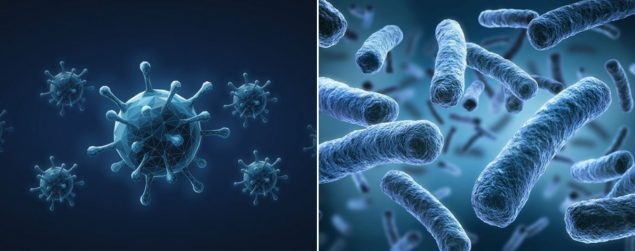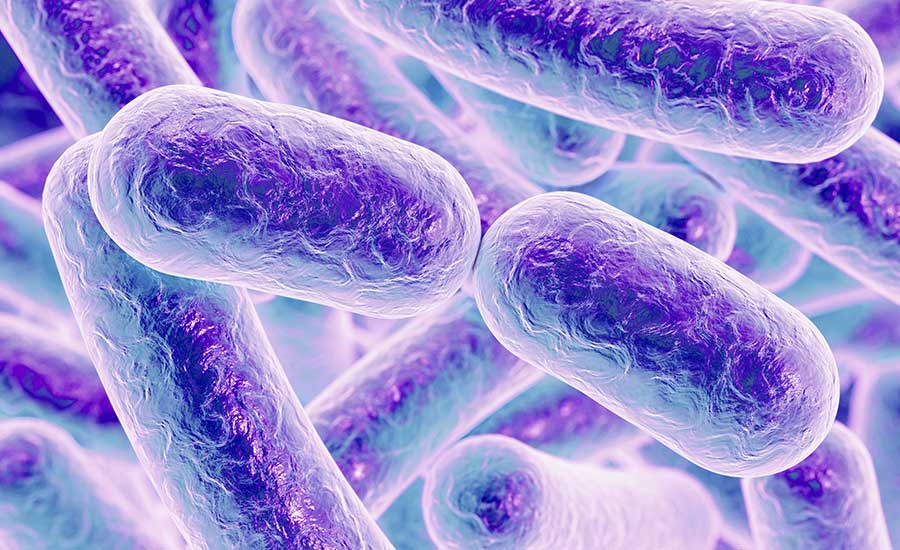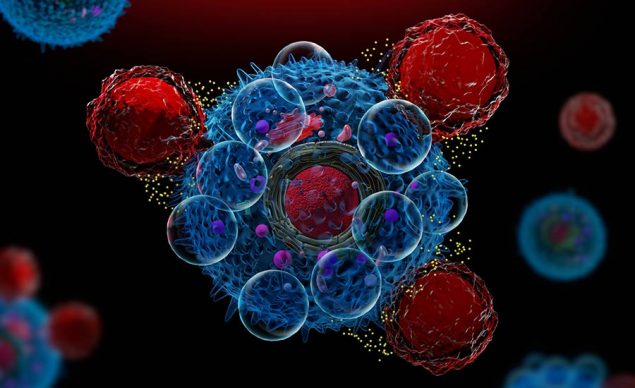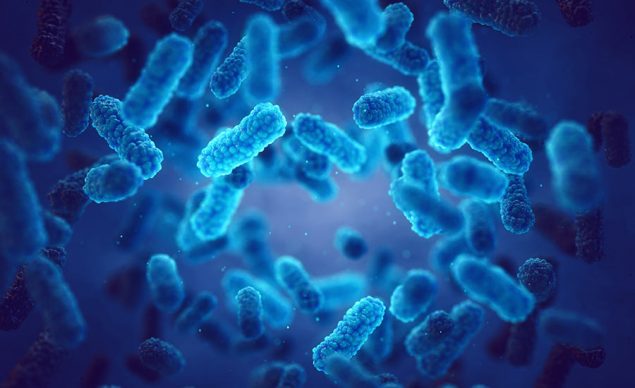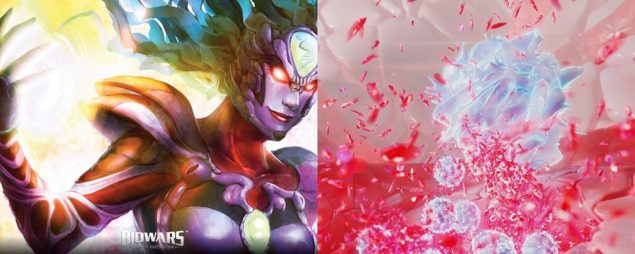Related Resources
Before you’re even born, microbes begin their colonization of your body. Even when you reach the 10 trillion cells that make up an average human being, bacteria outnumber them ten to one.
The good news is, many of these microbes are on your side, working in tandem with other microscopic allies to maintain your body’s health.
This is where some particularly tough Biowars characters come in to take care of business — namely the lymphocytes Blastor, Gamma-9, Humron, Alpha-1, Cid and Syrinx.
But what are lymphocytes exactly? Read on to find out!

What Are Lymphocytes?
To fully understand what lymphocytes are, let’s take a step back and explore the biology of probably the most important substance in your body — your blood.
Now, blood does a lot more than leak out onto the counter when you get distracted while slicing carrots.
It delivers oxygen to wherever it needs to go, helps remove toxic waste from your cells and more. In fact, many scientists even consider blood to be an organ in its own right — that’s how amazing and special it is!
If you haven’t been skipping your biology classes, you’ll remember that blood is made up of different types, held together by plasma. The three most important types of blood cells are:
- Red blood cells (RBC) or erythrocytes contain the protein hemoglobin and help transport oxygen and carbon dioxide.
- Platelets or thrombocytes clog the wound whenever you get hurt to stop the bleeding.
- White blood cells (WBC) or leukocytes help your immune system overcome harmful bacteria and viruses.
- Now, getting back to lymphocytes — can you guess which blood cell type they belong to?
Lymphocytes are members of the white blood cell family, which also includes macrophages and several other cell types.
Each white blood cell variety plays an important role in protecting your blood and body against bacteria, fungi, viruses, parasites, inflammation and other dangers.

Comparing The Different Types Of Lymphocytes
Lymphocytes branch into three distinct groups, all unique in their purpose and behavior. There are B cells, T cells and NK cells.
#1: B Cells
Blastor and Gamma-9 represent B-Cells in Biowars. Both Biowarriors are crafted after the real duties and structures of their scientific counterparts.
As far as B cells go, they get their name from their ability to bind to specific antigens of a particular molecular configuration inside the human body.
This is done through their BCR, an acronym for a B Cell Receptor, which hooks the harmful antigen, reels them in, engulfs them and starts devouring them.
Then, once the antigen is consumed, it’s digested into tiny, dissolvable fragments.
Considering that antigens aren’t good for your body, your B cells are doing you a big favor when they break down the bad guys.
But another cool thing about B cells is their ability to clone themselves and create (through mitosis) an exact copy of themselves with identical BCRs – all with the aid of Helper T cells, of course.

#2: T Cells
Like the B Cell Biowarriors, the T Cell heroes also take after their organic equivalents in Humron and Alpha-1.
And just like B cells, T cells also contain identical T cell receptors, or TCRs, on their surfaces.
Originating in the bone marrow alongside B cells, they eventually migrate to the thymus to continue maturing.
T cells differ from B cells by not producing antibodies to eliminate antigens, but by lending a hand nonetheless in their total annihilation.
How is this done?
Let’s put it this way: T cells are the commanders of your body’s biological forces, deploying macrophages to places where an infection is occurring, and letting them do the dirty work.
That is unless they’re playing the role of a cytotoxic T cell, which gives them a ruthless ability to kill infected cells, damaged cells and mutated cancer cells with equal parts charisma and total brutality.
So now that we’re talking cell killers, you should learn a little bit about NK cells — your body’s fiercest warriors.

#3: NK Cells
Here’s where the Biowarriors Cytox and Syrinx enter the picture.
Just like the cytotoxic T cells, NK cells, also known as Natural Killer cells, provide rapid-response warfare on cancerous and other types of infectious cells to stop them in their tracks.
As part of the innate immune system, Natural Killer cells limit the spread and damage caused by biological troublemakers.
Natural Killer cells are also created in your bone marrow. However, unlike T cells, Natural Killer cells develop outside of the thymus.
With B cells named after the bone marrow where they originate, and with T cells named after the thymus where they mature — how in the world did Natural Killer cells get their supremely bad-to-the-bone name?
The answer is simple — the NK cells are merciless when it comes to exterminating unwanted infections.
When approaching a targeted cell, Natural Killer cells release chemicals that serve as a breaching charge to a cell’s wall.
These chemicals burst that microscopic bad guy’s bubble and end the battle before it could ever start. Simple, brutal and beautiful.

What Causes Low Lymphocytes?
Having a healthy lymphocyte count is essential to your health and well-being. However, sometimes your immune system may find itself running low on lymphocytes.
Normally, you can find out what your lymphocyte count is with a blood exam — such as a complete blood count (CBC) test.
This can point to some underlying health issues that you might want to have checked out.
Usually, a low count can be caused by:
- A recent illness — especially a viral or bacterial disease
- Extreme exhaustion
- Stress or anxiety
Of course, none of these issues are very alarming and can be resolved with a healthy diet and a good rest.
However, in some cases, a low count can be a sign of a more serious condition called lymphocytopenia or lymphopenia.
This condition is usually caused by:
- Incredibly rare hereditary disorders
- Autoimmune disease
- Nerve disorders
- Some chronic viral disease, such as AIDS
What If Your Lymphocytes Levels Are High?
As we’ve established, having a low lymphocyte count is not the ideal situation. But what if there are a few too many of them in your blood?
Well, that’s not the ideal situation, either. Of course, the implications of having a high count are not as serious as is the case with a low count.
Usually, a high count is observed if your immune system is actively working to destroy a harmful infection or reduce inflammation somewhere in your body.
However, it may also point to an underlying condition called lymphocytosis, which is typically a sign of chronic autoimmune illness, digestive issues or in some cases, cancer.
Wrapping Up On Lymphocytes
Lymphocytes are more than just another type of white blood cells.
Represented by Blastor, Gamma-9, Humron, Alpha-1, Cid and Syrinx, they are fearless warriors who only have one goal — to protect your body and your health.
So next time you catch a cold, don’t feel too bad when you get a fever. That’s nothing but a sign that your B cells, T cells and NK cells are fighting a battle against whatever virus or bacteria that’s making you feel sick.




